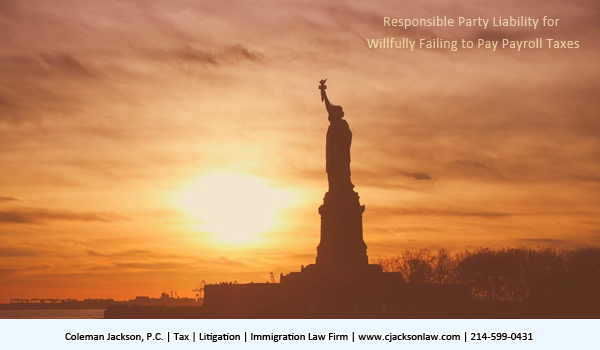June 12, 2017
Coleman Jackson, Attorney, CPA
The Internal Revenue Code, 26 U.S.C. § 6672 authorizes the Internal Revenue Service to demand collection of unpaid payroll taxes from persons responsible for paying those taxes if those persons willfully fail to pay the payroll taxes in the normal course of running a business. This statutory duty is imposed on “an officer or employee of a corporation, or a member or employee of a partnership, who as such officer, employee, or member is under a duty to perform the act” imposed by the satute. See 26 U.S.C. §6671(b) (2000). Similarly, a member or employee of a limited liability company, or any other form of business entity, with a duty to perform under the statute can likewise be deemed a responsible party under 26 U.S.C. §6672.
Liability for willfully failing to pay payroll taxes is imposed under 26 U.S.C. §6672 on “a person required to collect, truthfully account for, and pay over any payroll tax if the person willfully fails to collect such tax, or truthfully account for and pay over the payroll tax or willfully attempts to in any manner to evade or defeat any such tax or the payment thereof”. A person with responsibility under the statute who fails to perform this duty is subject to a 100% tax penalty, which is a penalty equal to the amount of payroll tax evaded, or not collected or not properly accounted for or not paid over to the Internal Revenue Service. See 26 U.S.C. §6672(a). These officers, members and employees are known as responsible parties under 26 U.S.C. §6672. 
The meaning of this tax statute, like all laws in the United States is ultimately determined by the judiciary. Courts are the final governmental body in the U.S. who says what the law is. In a practical sense- what does 26 U.S.C. §6672 mean to businesses, those who own them and those who work for them? It depends upon where in the United States the taxpayer resides because the United States is divided into several federal courts of appeal’s jurisdictions. The laws in the circuits are not always the same, even though, as it is here, the same federal statute is being interpreted. The fifth circuit is the federal circuit where our law firm is located. Anyone outside of the fifth circuit must be abundantly careful because the law where they are could be drastically different with respect to responsible party litigation under 26 U.S.C. §6672.
This blog will discuss the law in the Fifth Circuit Court of Appeals which includes Texas, Mississippi and Louisiana. The taxation, litigation and immigration law firm of Coleman Jackson, P.C. is located in Dallas, Texas. For a long time now, the Fifth Circuit Court of Appeals have said that willfulness under 26 U.S.C. §6672 can be established in two ways: (1) the Internal Revenue Service can prove willful violation of the statute by presenting credible evidence that the responsible person had knowledge that payroll taxes were due the United States and other creditors were being paid; and (2) The Internal Revenue Service can prove willful violation of the statute by presenting credible evidence that the responsible person acted with reckless disregard that the payroll taxes were not being collected, or paid or turned over to the Internal Revenue Service. There is no requirement of ill will or evil intent here. The reckless disregard of risk standard is met when the responsible party clearly ought to have known that there was a grave risk that withholding taxes were not being paid and was in the position to find out with little or no effort. Intentional ignorance or willful ignorance is enough in the fifth circuit to impose the 100% penalty on a responsible party; but negligence is not enough to find a person a responsible party under 26 U.S.C. §6672. See Morgan v. United States, 937 F.2d 281 (5th Cir. 1991) and its long line of progeny that basically governs the responsible party analysis for taxpayers located in the States within the Fifth Circuit Court of Appeal’s jurisdiction.
Another fifth circuit federal case known as Conway establishes the contours of a potential reasonable defense argument where an officer, member or employee can produce evidence that they relied on professional advice or counsel under certain circumstances. In tax law, reasonable defense arguments must be based in fact and circumstances demonstrating that an owner or member or employee is not responsible, after all, for the business’ failure to collect and timely turn over payroll withholding taxes to the Internal Revenue Service. See Conway v United States, 647 F.3d 228 (5th Cir. 2011).
This blog only addresses the law in the fifth circuit as it stands today; the law can change without notice. When a Judge sits on the bench and makes a ruling, that ruling is the law in its jurisdiction- and sometimes nationwide, unless that Judge reverses, or until some higher court in its jurisdiction reverses, or the United States Supreme Court rules.
This law blog is written by the Taxation | Litigation | Immigration Law Firm of Coleman Jackson, P.C. for educational purposes; it does not create an attorney-client relationship between this law firm and its reader. You should consult with legal counsel in your geographical area with respect to any legal issues impacting you, your family or business.
Coleman Jackson, P.C. | Taxation, Litigation, Immigration Law Firm | English (214) 599-0431 | Spanish (214) 599-0432


